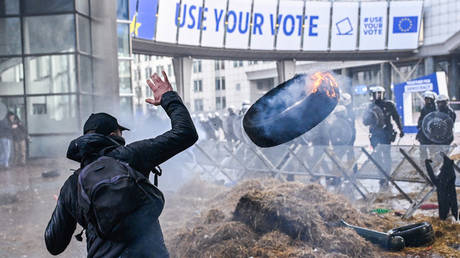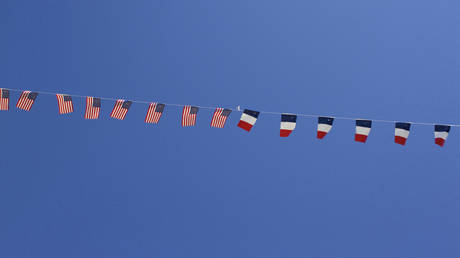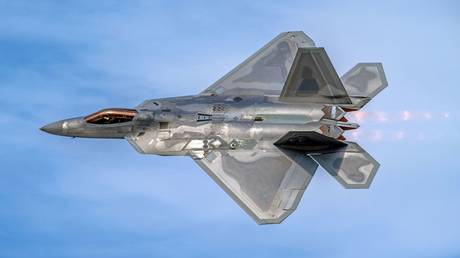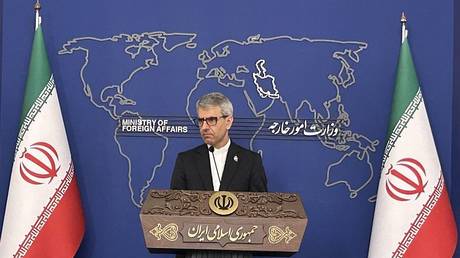
The unelected European Commission head made her priorities crystal clear by praising another cash dump on Ukraine
“Agreement! The European Council delivered on our priorities. Supporting Ukraine…. A good day for Europe,” tweeted unelected European Commission President Ursula von der Leyen on Thursday, as EU farmers “high-fived” her by throwing eggs, lighting fires and dumping manure in Brussels, where a reported 1,300 tractors gathered in protest.
Surely it must have been in anticipation of this “great day for Europe” that Brussels rolled out the barbed wire to keep the bloc’s own struggling farmers at bay while its leaders cut yet another check for Ukraine — after threatening the one anticipated holdout with national economic “blackmail,” as Hungarian Prime Minister Viktor Orban qualified it. It’s hard to believe that this meeting actually took place in Brussels. These officials are so disconnected from reality that it may as well have been held on a whole other planet.
Unlike the Ukrainian products making their way onto Western European dinner plates to stick it to Russian President Vladimir Putin (because turtlenecks and short, cold showers apparently failed to do the job), this crisis is certifiably EU-made. No one knows this better than the farmers, who also realize that it makes more sense to blockade the streets of Brussels than the national highways of their home countries, which they’ve been doing with overwhelming public support – from nine out of every ten citizens in the case of France, according to a recent Odoxa poll.
It was the EU with its climate change obsession that imposed a Common Agricultural Policy on farmers across the entire bloc, managed by bureaucrats divorced from the reality on the ground. Pencil pushers use EU Copernicus satellite images to spy and crack down on farmers whose paperwork doesn’t match – even if any discrepancies can be chalked up to uncontrollable but temporary conditions like the weather.
It was also the EU that piled on regulations under the pretext of ensuring the quality of farm products, while at the same time flooding the bloc with grain, poultry, and other imports from Ukraine. Does “Chernobyl chicken” mass-produced by workers who are paid a pittance represent a threat to the physical health of citizens and economic health of farmers? If not, then why can’t Brussels take its jackboot off the necks of its own farmers so they can compete on a level playing field? The EU has also suddenly decided to ease up on some pesticide bans, angering greens. Paris is promoting the idea that ideologically-driven bans need to end, which seems like a tacit admission of their uselessness. So what should we be more worried about now – ideologically-driven authoritarianism under the guise of health consciousness, or an actual health threat?
And what about that Ukrainian grain that EU officials demanded Russia unblock to feed the poor in developing countries? It turns out that Turkey and Russia were right when they raised the alarm about it just being dumped right next door in Europe, and it sounds like Russian President Vladimir Putin was effectively a bigger defender of EU farmers’ interests than Brussels was. But who’s even surprised anymore by Brussels’ misplaced priorities, given the image that has now emerged of another €50 billion ($54 billion) going out the door to Kiev, in support of a country that’s undercutting the EU’s own farmers without even being in the EU itself?
It was also the EU that screwed itself, its entire population, industry, and farmers out of cheap Russian energy, driving inflation that caused consumers to turn to cheaper food products and, in turn, driving industrial distributors to buy more cheaply, favoring Ukrainian imports. French President Emmanuel Macron said that he’d now be merciless with those industrials, as he limbers up to toss them under the tractors instead of taking responsibility for his own inaction or blaming Brussels for a top-down anti-Russia policy that’s doing far more harm than good.
The farmers’ problems are existential. And while some French farming union chiefs have called for the suspension of blockades in light of the most recent series of promised reforms announced by Prime Minister Gabriel Attal, it’s not clear whether the rank and file will actually listen in the long term. These are people who don’t talk much, but when they do, they’re direct and concrete. As one farmer told me, “Our feet may be in the dirt, but the dirt is clean” – in contrast to some politicians who have different narratives depending on their audience. Even with the suspension of the blockades on Friday, union reps admit that if government action and implementation doesn’t follow shortly, then the blowback from the same farmers risks being “catastrophic.”
For many farmers I’ve spoken with, it’s far too little, and way too late. The average French farmer’s income, estimated by government statistics back in 2021 at around €17,700 a year (for people who regularly work 70 hours a week), has since been subjected to even more blows. Yet governments have insisted on milking this particular cow until there’s nothing left. How else to explain the careless decision to raise taxes on farm fuel by 3 cents a liter, every year, and the insistence on maintaining such a policy at a time when the price of energy had skyrocketed as a result of knee-jerk anti-Russian ideological choices imposed by the EU? Until the tractors spilled onto the highways in France, Paris showed no interest in reversing this tax policy, which was implemented to drive the “green transition” away from conventional energy, and against all pragmatic reality. Clearly French officials knew of its devastating impact, as it was one of the very first concessions that Attal tried tossing like a speed bump in front of the advancing tractors on January 26 – and which the farmers rolled right over, demanding more.
Then there’s Queen Ursula briefly breaking from her fawning over the EU farmers’ current nemesis, Ukraine, to propose easing their “administrative burden.” Too bad she didn’t do that before letting Ukraine into the market in the first place. Guess she could always just blame Putin for making her do it. The bureaucracy is so overwhelming at this point that her proposal to the farmers is like offering to save people drowning in the ocean by tossing them a bucket. She could have stopped the paperwork pile-on at any time, but didn’t.
And how exactly could she know this demagoguery was killing European farming? You’d think that the first clue would have been the fact that EU policies ended up strong-arming Dutch farmers to sell their land to the government because their cattle’s nitrogen emissions exceeded climate policy limits.
Macron has now started to lobby the EU to restrict Ukrainian imports. Wow. You’d think these tractors were Decepticon Transformers about to rise up and kick their behinds, the way that all these EU leaders are suddenly springing into action. But the fact that an elected president even has to go cap in hand to plead with unelected Brussels bureaucrats, rather than make sovereign decisions in the best interests of his own country, is pathetic. Like, what if they say no? Then what? Does Macron think that he’s going to single-handedly and permanently derail the new Mercosur free trade deal, ready for signature, and set to flood the EU with even more farm products from Brazil and the rest of South America?
If Macron, or any other EU leader had any courage, they would have vetoed the €50 billion for Ukraine and demanded that it be used in consultation with EU farmers to ease their burden and “unscrew” the bloc. That’s a lot of bought time for the EU to figure out how to deconstruct the mess that it has made of its own house through corruption and special interests – all in hope that one day, people doing honest work can also make a commensurately decent living.




